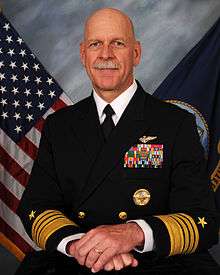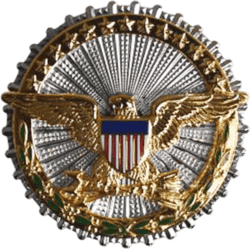Scott H. Swift
Scott Harbison Swift (born December 1, 1957) is a retired admiral in the United States Navy, serving as the commander of the U.S. Pacific Fleet from May 27th, 2015 to May 17th 2018. He previously served as the director of Navy Staff in the office of the Chief of Naval Operations.[2]
Scott H. Swift | |
|---|---|
 Admiral Scott H. Swift in May 2015 | |
| Nickname(s) | Notso[1] |
| Born | December 1, 1957 Honolulu, Territory of Hawaii, United States |
| Allegiance | United States |
| Service/ | United States Navy |
| Years of service | 1979 – 2018 |
| Rank | |
| Commands held | United States Pacific Fleet Director of Navy Staff United States Seventh Fleet Deputy Commander, Naval Forces; U.S. Central Command Director of Operations U.S. Pacific Command |
| Battles/wars | Operation Praying Mantis Operation Southern Watch Operation Enduring Freedom Operation Iraqi Freedom |
| Awards | Navy Distinguished Service Medal (3) Defense Superior Service Medal (2) Legion of Merit (3) Bronze Star Medal |
Naval career
Swift attended San Diego State University and received his commission in 1979 through the Aviation Reserve Officer Candidate (AVROC) program. He received his master's degree from the Naval War College in Newport, Rhode Island.
His operational assignments included Attack Squadron 94 (VA-94); Attack Squadron 97 (VA-97); Attack Squadron 122 (VA-122); Carrier Air Wing 11 (CVW-11) staff; commanding officer, Strike Fighter Squadron 97 (VFA-97); commanding officer, Strike Fighter Squadron 122 (VFA-122); commander, Carrier Air Wing 14; deputy commander, U.S. Naval Forces Central Command and U.S. 5th Fleet; commander, Carrier Strike Group 9; and commander, U.S. 7th Fleet. During those tours, he participated in combat Operations Praying Mantis, Southern Watch, Enduring Freedom, and Iraqi Freedom. He became director of the Navy Staff in September 2013.
His shore tour assignments included the Naval War College; commanding officer, Strike Fighter Weapons School, Pacific; F/A-18 requirements officer on the OPNAV staff; Office of the Undersecretary of Defense for Acquisition, Technology and Logistics staff; and director of operations, U.S. Pacific Command.
Swift has been recognized as the Naval Air Forces, U.S. Pacific Fleet landing signal officer of the Year, and was presented the Commander Michael G. Hoff Award as the U.S. Pacific Fleet attack aviator of the year.[3]
He was nominated for promotion to admiral on November 20, 2014 to assume the command of the United States Pacific Fleet and was confirmed by the United States Senate on December 11, 2014.[4] He took over from Admiral Harry B. Harris Jr. in a ceremony on May 27, 2015.
During the July 2017 Exercise Talisman Saber, an audience member at Australian National University asked Swift if he would carry out any order from President Donald Trump to launch a nuclear strike on China, to which Swift replied yes.[5]
On September 25, 2017, Swift announced that he would retire after he was notified by the chief of naval operations, Adm. John Richardson, that Swift would not be nominated to take over leadership of the United States Pacific Command, the inter-branch theater command for the Pacific region. Swift is among several flag officers to be removed or announce an early retirement following a series of deadly accidents involving Navy vessels in the Pacific Fleet in 2017. [6]
Admiral Swift was relieved by Admiral John C. Aquilino and officially retired from the Navy on May 17, 2018. [7][8]
Awards and decorations
 |
 |
| Navy Distinguished Service Medal with two gold award stars | |
| Defense Superior Service Medal with bronze oak leaf cluster | |
| Legion of Merit with 2 gold award stars | |
| Bronze Star | |
| Meritorious Service Medal with 3 award stars | |
| Air Medal with Combat V and bronze Strike/Flight numeral "2" | |
| Navy and Marine Corps Commendation Medal with award star | |
| Navy and Marine Corps Achievement Medal with three award stars | |
| Joint Meritorious Unit Award | |
| Navy Unit Commendation | |
| Navy Meritorious Unit Commendation with three service stars | |
| Navy "E" Ribbon with three Battle E devices | |
| National Defense Service Medal with service star | |
| Armed Forces Expeditionary Medal with three service stars | |
| Global War on Terrorism Expeditionary Medal | |
| Global War on Terrorism Service Medal | |
| Humanitarian Service Medal | |
| Navy Sea Service Deployment Ribbon with seven service stars | |
| Navy & Marine Corps Overseas Service Ribbon | |
| Navy Expert Rifleman Medal | |
| Navy Expert Pistol Shot Medal |
December 2015 Swift warned of a possible South China Sea arms race increase.[9]
References
- "Vice U.S. Pacific Command Change of Command". US Pacific Command.
- "Vice Adm. Swift nominated to take over Pacific Fleet". Stars and Stripes.
- Dan Petty. "Navy.mil Leadership Biographies".
- "U.S. Senate: Nominations Confirmed (Non-civilian)". 8 June 2015.
- Ramzy, Austin (28 July 2017). "What if Trump Ordered a Nuclear Strike on China? I'd Comply, Says Admiral". The New York Times. p. A8. Retrieved 29 July 2017.
- Kube, Courtney; Stelloh, Tim (September 25, 2017). "Pacific Fleet Commander to Retire in Wake of Deadly Crashes". NBC News. Retrieved September 25, 2017.
- U.S. Navy Pacific commander misses promotion, retiring after collisions Retrieved 19th May, 2018
- U.S. Pacific Fleet conducts change of command Retrieved 19th May, 2018
- U.S. Navy commander warns of possible South China Sea arms race 15 December 2015 MSN